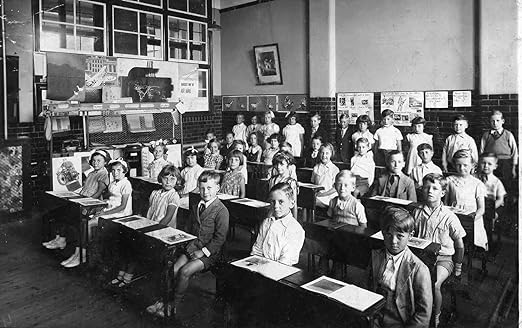Einstein once offered a brilliant quote: “Everybody is a genius. But if you judge a fish by its ability to climb a tree, it will live its whole life believing it is stupid.” Is getting a degree worth the time and money we invested? Should public schools be made mandatory? Why is the education system preventing students from learning?
Brief history of the education systems:
With the arrival of the Industrial Revolution, millions of workers moved away from home to enter urban areas for a job in factories. Now they were left with the problem of childbearing at home, since women were simultaneously moving into the workforce slowly. The solution, therefore, was to gather the children in one place during the day to be supervised. John Rockefeller, Horace Mann, and other business tycoons admired the “indoctrination model” constructed for kids in Prussia after being in war with Poland and poured billions of dollars in the 19th century to build the initial model of the education system in America (which hasn’t changed much as of today) to solve this dilemma and teach the next generation “necessary” knowledge to inherit their parents’ jobs to work in their factories. Schools became the daycare of middle-class worker families, but the nightmare of their kids’ intelligence and freewill. Rockefeller infamously said himself: “I don’t want a nation of thinkers, I want a nation of workers.”
Why it destroys free will?
Technology has advanced, principles have been updated, but the classroom has stayed the same. Attend, listen, take notes, discuss only when demanded, finish assignments, exam – there goes 20 years of your life. I want you to take a moment to really rewind everything you have learned: Can you list ten things that shifted your mind deeply? How much of them came from the classrooms that you invested thousands of hours in? The fundamental problem in modern education is the passive model it adopted for learning to take place. Not to disregard the importance of knowledge from the curriculum, but passively taking in information is far from enough. We put trust blindly in teachers and lost the ability of critical thinking to trace the truth. We have trouble navigating through our lives because we have been following instructions forever. We have lost interest in the most crucial skill of learning since it has become painful and inapplicable. The most valuable quality in humankind is the individual strength and weakness as we proceed in different trajectories, but with that being erased within the current system, the more likely turnout would be summarized by a quote from Les Brown: “Born unique, die copies.”
Grading system:
My life is determined by a number – by a series of numbers I fought hard to achieve with no ending. We felt drained but without it, our life seems to lack purpose. One of my friends told me randomly one day: “My bio and chem midterms are done today, but it feels weird, I don’t know my purpose of existence anymore.” It is indeed overdramatized by my narrative, but it stroke me suddenly – our education takes away the real meaning and enjoyment of knowledge and it is scary. Why are you studying? I have a test tomorrow. Why do you do the test? I want a 95+ in calculus. Why do you want it? My dream school demands it. What will you do after getting in? Repeat and get a degree. Then? Find a job in a big company. How interesting do you rate your life? There are fun things in between but…
Don’t get me wrong, standardized testing is probably the best model to select intelligence and talents that exist around the world. Any other approach would largely favour the rich and cause disproportionate class discrepancies.
But it’s important to highlight that grades are merely for selection. We live for something else: something higher and better. Besides the surface level criticism of the grading system nowadays like it doesn’t reflect our whole abilities, it’s too limited and not applicable and so on. If we develop the wrong relationships with studying due to this system, it’s catastrophic. Grades aren’t everything – sounds trivial but it’s genuine. We don’t have to live for a number. While it is crucial to master this skill for the selection mechanism, trying to look for an alternative is equally beneficial. Don’t wait until graduation to start cultivating your future, don’t stall on your habits due to non-ending tests, learn something that is not “helpful”, dive in wider knowledge just for the sake of it, save time in your schedule for personal development – Who are you outside of school, outside of UWaterloo?
That being said, do enjoy school if possible. Amazing people, amazing professors, amazing opportunities and platforms are here, so utilize them wisely and they become immensely helpful. School is a part of your identity and it is needed. But when problems are brewing, something needs to be done. It’s way too overpriced when free resources are available online, course selection and completion are extremely robust to cater individual needs (school dragged me down when I was ahead due to the “prerequisite” system), polarized political agendas suffocate thinkers, and there is a lack of any sort of education outside of academia (when you still can’t do tax and manage assets after a PHD).
Conclusion:
Education system is not education. It is a mere subset of education and you get to determine how small or big this subset gets to be. The crucial problem, especially for teens, is that the subset takes more than 90% most of the time, so the flaws and blindspots the system carries are directly projected to the maturing and developing of the young. They tend to think less outside the box, and the only other place they turn to is social media, which is more damaging on its own level. The world has more to it that you are seeing, so go explore, go learn, and go discover the exciting things that are embedded in life itself; it’s not worth it to be swallowed by depression constantly to miss the beauty in life. You have an option.
Try to deliberately reduce the time spent on coursework to perfect your personality in other ways. Reading will become more enjoyable than ever, your connection with nature will be strengthened, and the long lost passion for the world and yourself will be regained.
In short – educate yourself. Not in one way, but in every way.
Citations:
Gatsbe Exchange Vintage Old Photos, 8 x 10 Old Vintage Photo School Classroom 1937 Young Kids. Gatsbe Exchange Vintage Old Photos.
(Link to Image: https://www.amazon.ca/Old-Vintage-Photo-School-Classroom/dp/B01MD130WV)
Jake Tran. The Evil History of our Education System. (n.d.). Retrieved from https://youtu.be/JQWT_UT5HfQ?si=2p48sWx7ZTWGBHj7
Paterson, W. A. (2021, December 8). From 1871 to 2021: A short history of education in the United States. SUNY Buffalo State University. https://suny.buffalostate.edu/news/1871-2021-short-history-education-united-states





Leave a Reply